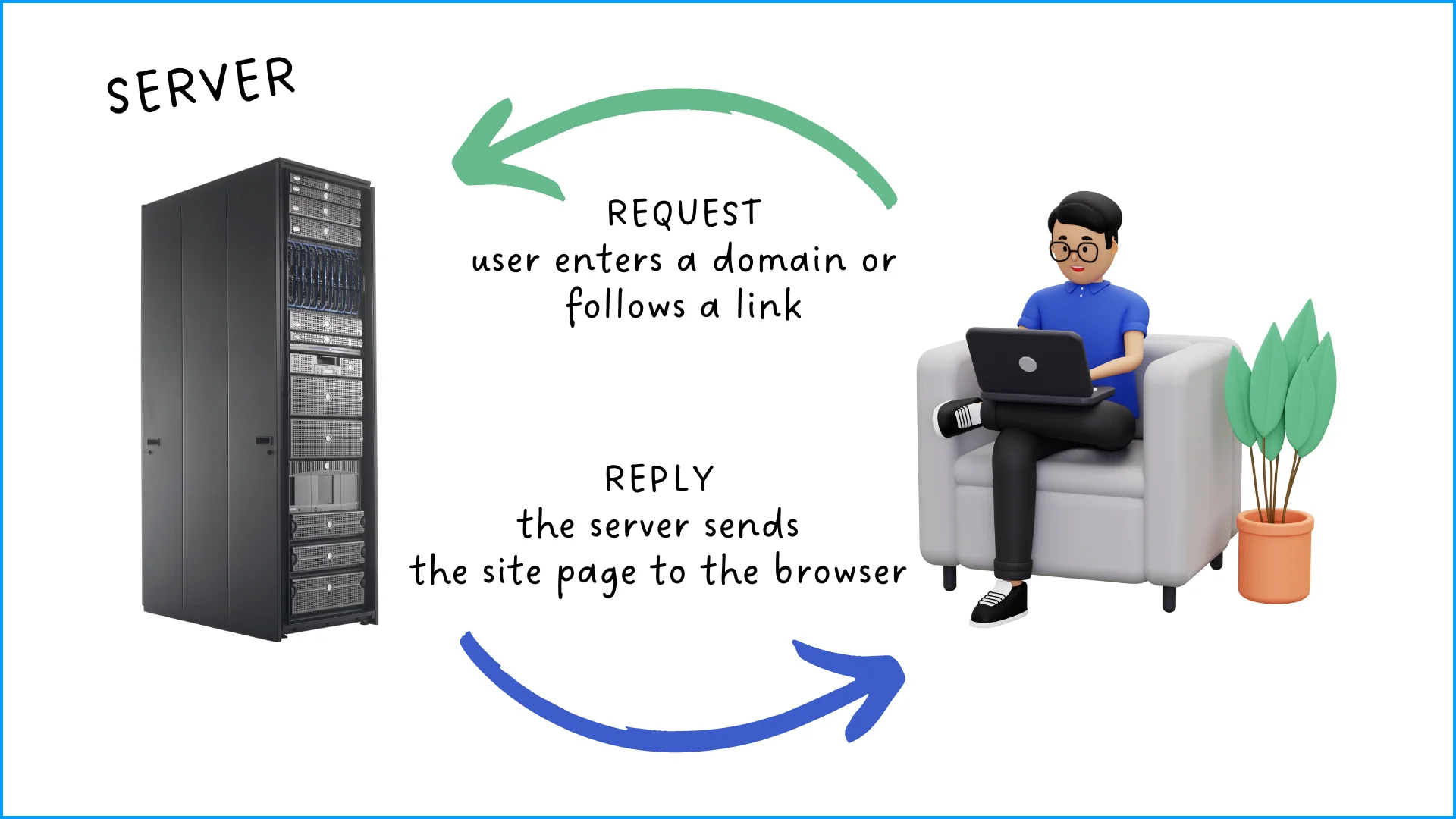
- What is a Domain
- What is Hosting
- How Domains Work
- How Hosting Works
- Useful Articles About Domains and Hosting
In the world of website creation, you often come across the terms "domain" and "hosting". They are essential components of any web project, but many beginners confuse them. In this article, we will explain in detail what a domain and hosting are in simple terms and how they differ.
What is a Domain
A domain is the unique name of your website on the Internet. It's what users type into the address bar of their browser to access your site. For example, in the address https://www.example.com/, the domain is the part "example.com".

Each domain consists of several parts:
- Prefix "www" — an optional part meaning "World Wide Web".
- Domain name — in our example, it's "example".
- Top-level domain (TLD) or domain zone — the part after the dot, such as .com, .org, .net, and so on.
Domains are registered with special companies called domain registrars. They ensure that each domain name is unique and registered only once.
Imagine you need to meet someone at their office. To find this office, you are given an address. Similarly, a domain works by encoding an IP address, allowing the browser to locate the website on the network.
What is Hosting
Hosting is a service that allows you to place your website on a server and make it accessible to users on the Internet. A server is a powerful computer that operates 24/7 and stores your website's files (HTML, CSS, images, videos, etc.).
There are several types of hosting:
- Shared Hosting — the most common and affordable option. Multiple websites are hosted on a single server and share its resources (CPU, memory, disk space).
- Virtual Private Server (VPS) — one server is divided into several virtual machines. Each of these acts as an individual server, providing more control and resources compared to shared hosting.
- Dedicated Server — you rent an entire server that is exclusively dedicated to your website or project. This is the most expensive but the most powerful option.
- Cloud Hosting — utilizes the resources of multiple servers, allowing the website to remain online even under high traffic loads and individual server failures.
If a domain is the address of a house, then hosting is the house where the website "lives".
How Domains Work
When you register a domain, you are essentially renting it from a domain registrar. A registrar is a company authorized to register and manage domains. The registration process involves choosing a domain name and is typically paid for annually. The registrar submits your domain information to a centralized database maintained by organizations like ICANN (Internet Corporation for Assigned Names and Numbers).
After registration, the domain must be linked to a specific server where your website files are hosted. This is done using the Domain Name System (DNS). DNS is like the Internet's phone book. When a user types your website's address into their browser, DNS servers translate that domain name into the IP address of the server where the website is stored. An IP address is a unique set of numbers that identifies a specific server on the network.
Read more about how domains work in the article: What is DNS and How the Domain Name System Works
It's important to understand that a domain is not just an address but a crucial tool for the identification and promotion of your website. It makes your web resource accessible and recognizable to users worldwide.
How Hosting Works
The main elements of hosting are servers, data centers, and specialized software. A server is a powerful computer that stores your website's files and provides access to them over the Internet. Servers have significantly greater power and reliability than regular home computers. They are housed in specially equipped buildings called data centers or Data Processing Centers (DPC). These data centers provide the necessary conditions for server operation: temperature control, backup power, and high-speed internet connectivity.
The hosting process begins with uploading your website's files to the hosting provider's server. This can be done using FTP (File Transfer Protocol) or through a control panel provided by the hosting provider.
The server stores all your website's files, including HTML documents, images, styles (CSS), scripts (JavaScript), and other data. All these files are organized into a directory structure that reflects the structure of your website.

When a user types a website address into their browser, this request is sent to the server. The web server processes the request and finds the appropriate files to send back to the user. The server sends the necessary files back to the user's browser, which processes these files and displays them as a web page.
For websites with dynamic content, such as online stores or social networks, the server also handles database requests. For example, when a user requests information about a product, the server accesses the database, retrieves the necessary information, and includes it in the response sent to the user.
It is best to register your domain and hosting with the same company, making administration easier. Most hosting providers, like Cityhost, also function as domain name registrars.
Useful Articles About Domains and Hosting
We publish many useful and informative articles on our blog that will help you make the most effective use of our services. Here are a few that will expand your knowledge about domains and hosting:
- How to Create Your Own Business Website: Easily, Independently, and Relatively Cheaply
- Debunking Myths About Hosting Providers
- Top 11 Advantages of Domain Registrar and Hosting Provider Cityhost
- We Place the Site on the Internet — What Services to Buy and How Much They Cost
- How Hosting Affects the Ranking and Promotion of the Site
- XXX-files: What Can and What is Prohibited to Host
- How to Choose a Domain for Your Website
You will also find a lot of useful information in our FAQ.
Domain and hosting are the two main elements for launching your website, always working in tandem. At first glance, all the steps to publish a website on the Internet may seem complicated, but with a little time and effort, you will definitely succeed!










